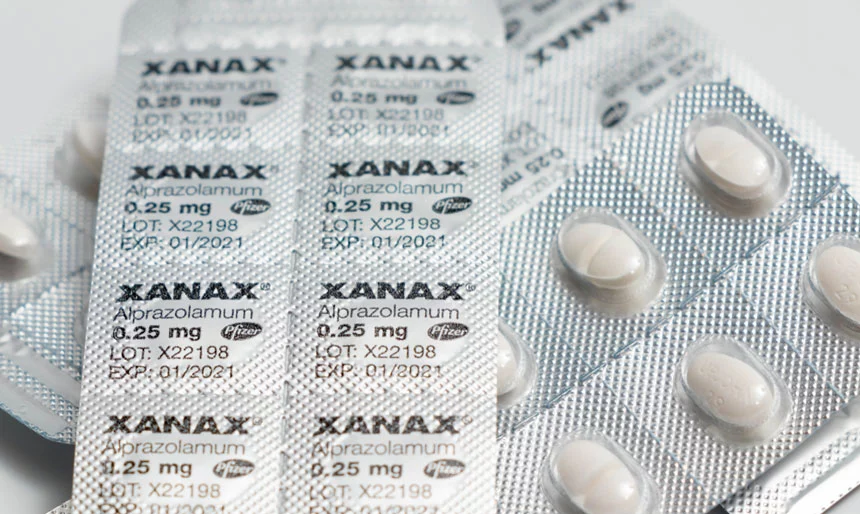Comparing Xanax and Buspirone for Anxiety
Table of Contents
- Comparing Xanax and Buspirone for Anxiety
- What is Buspirone?
- How Does Buspirone Work?
- What are Common Buspirone Side Effects?
- What is Xanax?
- How Does Xanax Work?
- What are Common Xanax Side Effects?
- Generalized Anxiety Disorder vs Panic Disorder
- Which Anti-Anxiety Medication Is Best to Treat Anxiety Disorders?
- Can Buspirone and Xanax Be Taken Together?
- What are the Side Effects of Abusing Xanax?
- Recognizing the Signs of Prescription Drug Abuse
- Addiction Treatment Methods for Benzodiazepine Addiction
- The Importance of Dual Diagnosis Treatment
- Recover from Anxiety and Addiction With Our Support
- Medically Reviewed By
When it comes to the Buspirone vs Xanax debate, there are many factors to consider when determining which of these anti-anxiety drugs is best for your specific needs. As with most prescription medications, there are several potential side effects and risks to be aware of before taking them.
If you’ve been struggling with anxiety, both medications form a potential lifeline, but also come with drawbacks. And if you’re also abusing substances of any other kind, finding a lasting and stable form of treatment is the healthier choice by far, and offers a life-changing way of addressing chronic anxiety.
Keep reading to learn more about the differences between Buspirone and Xanax and which, if any, of these medications may be right for you. With a commitment to providing recovery and mental health resources of all kinds, the Find Addiction Rehabs team is here to help!
What is Buspirone?
Buspirone is a medication used for treating generalized anxiety disorder, and gained approval by the U.S. Food and Drug Administration (FDA) in 1986. It typically comes in the form of an oral tablet, and prescribed in 5mg, 10mg, 15mg and 30mg doses.
Currently, taking Buspirone has also been found to be effective for treating depression, post-traumatic stress disorder (PTSD), and even teeth grinding issues that may arise as a result of taking other medications, including antidepressants. This medication has also been found to be helpful for treating agoraphobia (off-label).
Some studies have also shown that Buspirone may be effective for combating anxiety and agitation in dementia and Alzheimer’s disease patients, as well as reducing involuntary movements associated with other drugs used to treat Parkinson’s disease.
It is important to keep in mind that Buspirone is effective for providing slow, but continuous improvement in the user’s anxiety symptoms, rather than producing immediate results. This, of course, is what makes taking this medication a safer choice than other options.
How Does Buspirone Work?
Contrary to popular belief, Buspirone is not a benzodiazepine, but an azapirone, a class of drugs that have both anti-anxiety and anti-depressant properties.
Buspirone affects serotonin and dopamine receptors in the brain, in which the drug binds to 5-HT1A receptors, or those which have a direct role in the symptoms associated with anxiety disorders.
This interaction can produce a more relaxed state of mind over time, but will not produce an immediate sense of relief from anxiety or panic. For those struggling with more severe anxiety disorders, Buspirone may not be a first-choice for treatment.
What are Common Buspirone Side Effects?
As with any other medication, taking Buspirone can have some uncomfortable side effects. The most common of these are stomach discomfort, dry mouth, nausea, and fatigue.Other possible side effects that may occur when taking this medication can include:
- Headache
- Constipation
- Feeling weak or numb
- Feeling nervous or excited
- Depression
Some cases have also been reported in which those who have had mental conditions treated with Buspirone developed Tardive Dyskinesia (TD), a condition characterized by random and uncontrollable movements of the face and body. While there are few adequate studies linking the two, it is something to consider before taking this medication..
It is important to talk to your doctor before starting any medication, and make sure that this drug will be a good fit for you. If you are taking Buspirone and are experiencing any of these side effects, looking into other medication options or asking your doctor to reduce your dose may be a good idea.
What is Xanax?
Xanax (alprazolam) is a part of the benzodiazepine class, which are drugs used to treat an extensive variety of anxiety disorders, as well as anxiety triggered by depression. This drug can have an immediate calming effect on the user, easing anxiety symptoms and stress.
Generally, this drug is only prescribed in small doses due to its strength. The maximum dose for those who have been prescribed Xanax is 10 mg/day, although most people will only take around 0.25 to 1 mg/day.
If you do not feel that your dose is high enough, your doctor may slowly increase your prescription. However, taking higher doses can lead to uncomfortable side effects, including an increased risk of addiction.
How Does Xanax Work?
Like other benzodiazepines, Xanax works by increasing the activity of certain neurotransmitters in the brain. The drug affects the central nervous system, interacting with GABA receptors and boosting dopamine production in the brain.
This is what helps to reduce feelings of panic and anxiety in users. However, when not used properly, Xanax can produce an intense and euphoric high that can make people want to keep using it.
It is for this reason that Xanax has a high risk of addiction, as well as several other uncomfortable side effects. Because of its high risk for abuse, Xanax is usually only prescribed in low doses and for a short period of time, so as to reduce the user’s risk of forming a dependence on this medication.
What are Common Xanax Side Effects?
While Xanax can be an effective medication for treating anxiety, it can also have various adverse effects, even when using this drug as prescribed. Some of the most common side effects people may experience when taking Xanax include:
- Upset stomach
- Blurred vision
- Appetite changes
- Drowsiness
- Light-headedness
- Fatigue
- Headache
- Trouble concentrating
- Constipation
When taking Xanax for a long period of time, individuals may also develop memory problems, kidney problems, weight changes, and a change in sex drive. In more severe cases, individuals may also experience:
- Respiratory depression
- Seizures
- Severe rashes
- Jaundice
- Confusion
- Speech impairments
- Poor coordination
These symptoms can be indicative of an overdose, and emergency medical help should be sought immediately if you or someone else is experiencing any of these effects after taking Xanax.
Generalized Anxiety Disorder vs Panic Disorder
Despite their many shared symptoms, generalized anxiety disorder (GAD) and panic disorder are two very different mental health disorders. Knowing how to recognize the differences between these conditions can help you or a loved one get the help you need, and understand what treatment methods will be best for your particular symptoms and concerns.
For those struggling with GAD, their symptoms may include excessive worrying, nervousness that impedes the ability to function properly, difficulty sleeping, fatigue, muscle tension, feeling irritable, brain fog, and digestive problems.
A panic disorder, on the other hand, can be characterized by recurring panic attacks, derealization, depersonalization, constant worrying about the future, pain in the chest, tremors, rapid heart rate, and trouble breathing.
For those struggling with these disorders, anti-anxiety medications like Xanax, Buspirone, and other drugs can help manage these symptoms and allow them to live functional, less inhibited lives.
Which Anti-Anxiety Medication Is Best to Treat Anxiety Disorders?
Now that you understand what each of these medications is and how they work, it is time to revisit the Buspirone vs Xanax debate. As discussed, both Buspirone and Xanax are capable of providing relief from anxiety symptoms.
However, there are several arguments that can be made supporting Buspirone as the better alternative. When comparing alprazolam versus Buspirone, the latter causes less sedation, a lower risk for substance abuse, and is better suited to long-term treatment.
Are Either Medications Safe During Pregnancy?
Buspirone also takes the lead in the pregnancy category, as it has been found to be safe for pregnant women to take and continue breastfeeding their babies. In fact, children as young as six years old can safely take this medication, whereas Xanax is restricted to those who are 18 and older.
Furthermore, Xanax can only provide short-term relief from a person’s anxiety symptoms, and long-term use will almost invariably lead to dependence if not outright addiction. When using Buspirone, most people will ultimately experience fewer adverse side effects and will not have to worry about becoming addicted to this drug.
Can Buspirone and Xanax Be Taken Together?
Whenever you are considering taking multiple medications, it is always important to first consider how these drugs interact with each other. If you are considering using a Buspirone-Xanax combination to manage your anxiety, it is important to be aware of the dangers of doing so.
This combination can have many negative drug interactions. In fact, when taking Buspirone, this drug can interact negatively with many other medications, including sedating antihistamines, monoamine oxidase inhibitors, oral contraceptives, and others.
Those who are taking Buspirone are also strongly advised not to drink grapefruit juice, as this can cause an allergic reaction. People also report negative interactions between Buspirone and St. John’s Wort, a natural herb, which includes an increased risk of developing a condition called serotonin syndrome, which can have severe side effects.
When considering taking Buspirone with another medication or supplement, it is important to always talk to your healthcare provider ahead of time and make sure it is safe to do so.
What are the Side Effects of Abusing Xanax?
Just as taking the medication as prescribed can still cause uncomfortable side effects, abusing this drug can lead to severe health complications. Depending on your medical history, these symptoms can be life-threatening. Some common side effects of chronic Xanax abuse include:
- Heightened anxiety and depression
- Organ damage
- Loss of cognitive function
- Weight loss and nutritional deficiencies
- Addiction
These are just a few of the symptoms associated with long-term Xanax abuse. Without seeking professional help, it can be very difficult to stop using this medication and recover from the toll it is taking on your physical and/or mental well-being.
Recognizing the Signs of Prescription Drug Abuse
Recognizing that you or a loved one may be struggling with an addiction can be difficult, especially when this involves a medication like Xanax. However, accepting that there is a problem is the first and most important step to getting help.
There are many signs that can indicate if someone may be struggling with prescription drug abuse, including:
- Using higher doses or more often than is prescribed.
- Using medication without a prescription.
- Getting prescriptions from multiple healthcare providers, or “doctor-shopping.”
- Becoming more secretive or isolated from friends and loved ones.
- Wanting to stop using, but being unable to do so alone.
- Developing withdrawal symptoms when not using the medication.
If you recognize any of these signs, whether in yourself or a loved one, then it is time to get professional help. Xanax addiction can be a life-threatening condition, and should not be allowed to progress once it has been recognized.
Addiction Treatment Methods for Benzodiazepine Addiction
Because of how severe the nature of Xanax addiction can be, there are many treatment options available to help those struggling with benzodiazepine abuse overcome their addictive habits. Everyone’s addiction recovery experience will differ based on their specific situation, but will typically involve:
Medical Detox
Benzodiazepine withdrawal symptoms can be severe and can include headaches, tremors, seizures, hallucinations, and other side effects. Because of how intense this withdrawal period can be, the Xanax addiction treatment process will usually start with a medical detox.
This will typically involve constant supervision from licensed medical professionals, nutritional counseling, and medications to help minimize symptoms of withdrawal and substance cravings during the early stages of recovery.
Inpatient vs Outpatient Treatment
When recovering from a benzodiazepine addiction, it is usually best to do so in an inpatient or residential treatment setting. These will require you to live on-site of your treatment facility so that you can receive constant support and structure during the recovery process.
While outpatient treatment can provide more affordable and flexible care, this may not be ideal for those recovering from Xanax abuse. This particular substance use disorder will usually require extensive support while a person is recovering so that both their addiction and its underlying causes can be properly addressed.
Medication-Assisted Treatment
There are several types of medications that can be used to treat alprazolam withdrawal. These can be used alongside other treatment modalities or as a stand-alone intervention, but are most effective when used as part of a comprehensive treatment plan.
If you are recovering from an addiction to Xanax, you may be prescribed several different medications to help manage your withdrawal and prevent relapse, including:
- Antidepressants
- Flumazenil
- Over-the-counter medications
The Importance of Dual Diagnosis Treatment
One of the most important steps in treating a Xanax addiction is to participate in a dual diagnosis treatment program. This is because many people who are struggling with Xanax abuse started using this drug to manage a mental health disorder.
This means that, in order to effectively treat their addiction, they must address its underlying causes as well. When participating in a dual diagnosis program, you may have access to various evidence-based therapies and holistic treatment methods, including:
- Cognitive behavioral therapy (CBT)
- Music and art therapy
- Individual counseling
- Group therapy
- Family therapy
These are just some of the many different therapies used to treat substance use disorders. If you are not sure what treatment programs will be best for you, the Find Addiction Rehabs team is here to help you understand all of your recovery options.
Recover from Anxiety and Addiction With Our Support
If you or a loved one is struggling with benzodiazepine addiction, the Find Addiction Rehabs team can help you find recovery resources and treatment programs nationwide.
Our hotline is available 24/7 to answer all of your recovery questions and help you connect with rehab facilities that can provide all of your care needs. Give yourself the chance you deserve at a happier, sober life, and call now to get started today!
Deborah Tayloe is a freelance writer specializing in health and sciences. Deborah earned a B.S.Ed. in Secondary Education/English, accompanied by a Spanish minor. Her writing expertise allows her to craft engaging, impactful articles to help people be well.
In addition, she holds a fully accredited Certificate of Natural Medicine and is a certified Herbalist. Through her understanding of complementary medicine, Deborah helps medical professionals give people the information they need to embrace natural approaches to wellness.
When she’s not working, Deborah trains for 5K races and advocates for animal rights.







